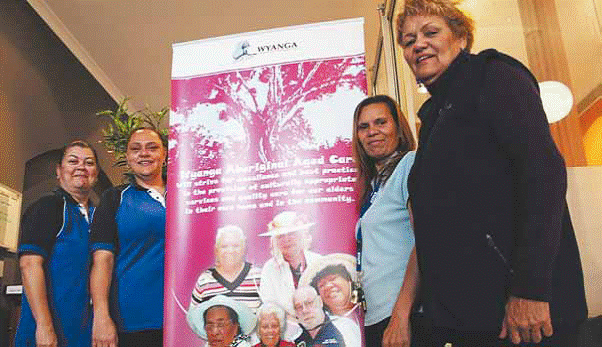
Funding quality care for Elders
Wyanga is one of the first Aboriginal community-controlled aged-care providers for Aboriginal Elders in the Sydney Metropolitan area. Since its establishment in 1996, Wyanga has offered a range of services such as domestic housework, transport and advocacy assistance as well as activities, outings and excursions. Art and crafts activities are planned for each Tuesday, which the Elders really enjoy. Most importantly, Wyanga provides each client with an assigned Aboriginal carer, who is chosen by the client and who might be a family member.
Millie Ingram, the CEO of Wyanga, says the services are designed to accommodate the individual needs of each client. ‘I would like Aboriginal people to know that we are here,’ she says. “We are taking names for the waiting list and we will do home visits until we can get the necessary CACP (Community Aged Care Package) for each applicant. If people are interested please come drop by at 35 Cope Street near Redfern Station, or ring us on (02) 9319 7175.
Looking back, Millie finds that it has been a good but slow journey. ‘We currently provide 50 CACPs to Elders and we could do with 50 more,’ she says. Getting additional packages is difficult since Wyanga competes with other NGOs to get their application approved by the government. ‘We do not have the resources to hire professional submission writers, which is a disadvantage,’ Ms Ingram adds.
She believes that closing the gap is not possible as long as this tendering process exists. ‘We need select allocation as an alternative. If our Elders can’t come to us, they won’t go anywhere,’ she says. ‘The government has known this for the past 40 or 50 years.’ She mentions that Wyanga is hoping to work on the issue of residential care facilities. ‘Existing residential aged care facilities cannot always meet the needs of Aboriginal Elders,’ she says. ‘Families are not willing to send their Elders to places where they are isolated from their community.’ This is reflected in the fact that most Elders pass away at home or in hospital.
Ms Ingram says that Wyanga is seeking to enter a partnership with other organisations such as Anglicare, Uniting Care, Mission Australia and Catholic Care to look at cluster grouping for Aboriginal Elders in their aged-care facilities. Wyanga is also looking at smaller residential group home type services. Ms Ingram adds: ‘The government should accommodate innovative projects which allow Elders to remain in their own area with their family support. Aboriginal employment should be integrated into these group homes.’ Wyanga is hoping to increase its services by 10 clients each year. Millie Ingram also plans to meet the needs of an increasing number of people with dementia. ‘We would like to work with people affected by dementia and advocate on their behalf.’ To accommodate people in their care, Wyanga needs the funding gap to be closed. Melanie Fiedler